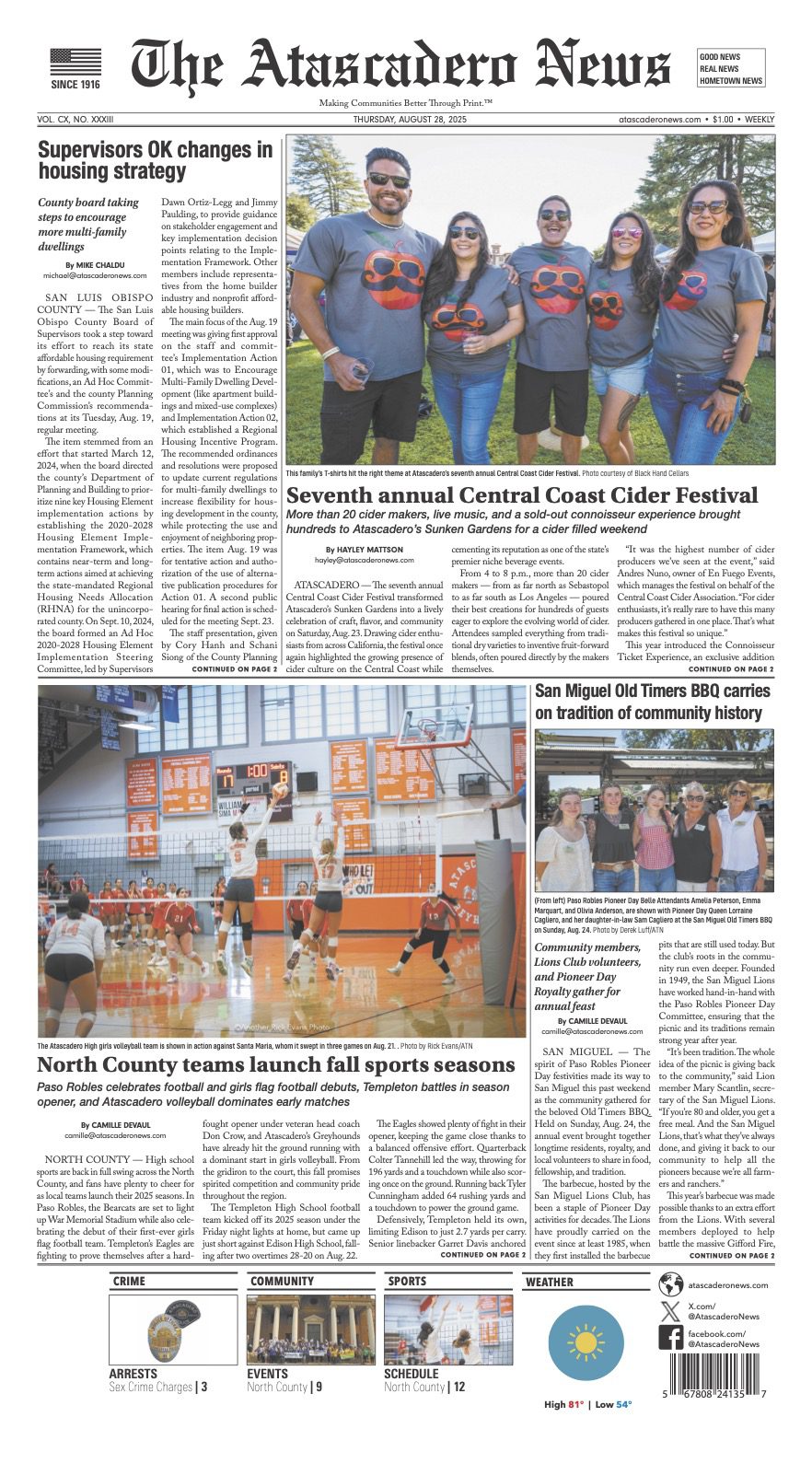24 will affect many in 2024
By Judy Abel
Special to Atascadero News
CALIFORNIA — A slew of new laws set to take effect in 2024 have been signed by California Gov. Gavin Newsom. Here are 24 significant ones:
CALIFORNIA EMPLOYMENT LAWS
Once again, the state minimum wage will increase to $16 per hour on Jan. 1 regardless of employer size. That’s an increase of 50 cents an hour for most workers, although some cities have higher minimum wages with a minimum hourly rate of $16.90 that went into effect July 1, 2023.
The minimum wage for health-care workers will increase to $23 per hour. Workers must be employed under covered health-care facilities in California. The bill goes into effect starting June 1.
Starting Jan. 1, workers with the same employer for 30 or more days within their starting year are eligible for paid sick leave. The bill will require an employee to have no less than 40 hours or five days of accrued sick leave or paid time off by the 200th calendar day of employment, or in each 12-month period.
Employers must offer reproductive leave. The California Fair Employment and Housing Act also makes it unlawful to refuse a request by an employee to take up to five days upon the death of a family member. This bill would allow reproductive leave within three months of the event and will use other leave balances otherwise available to the employee. An employer may deny leave for more than one reproductive loss within 12 months. The bill will go into effect starting Jan. 1.
Beginning Jan. 1, SB 731 requires an employer to provide a 30-day advance written notice before requiring remote employees to return to an in-person setting. The notice would also explain the employee’s right to remain remote as an accommodation, if applicable, to their disabilities.
SB 700 bans discrimination against a job applicant based on information regarding prior use of cannabis that is learned from a criminal history.
Employers will be required to give an employee written notice of the federal H-2A visa in English or Spanish, at the employee’s request. Other languages may also be included and require the Labor Commissioner to create a template that complies with these requirements. The bill goes into effect starting March 15.
CALIFORNIA HOUSING
Landlords will be required to cap security deposits at one month’s rent whether the unit is furnished or not. This new law will allow owners of no more than two rental properties, or no more than four units, to request up to two months’ rent. The bill will go into effect starting July 1.
Tenants in rent-controlled units who have permanent disabilities related to mobility must be allowed to relocate to an available and accessible unit at the same rental rate and terms. This requirement will apply to properties with five or more rental units and will take effect on Jan. 1.
SB 267 prohibits the use of a person’s credit history as part of the application process for a rental housing accommodation. Tenants must offer the applicant the option to provide reasonable evidence to pay, such as government benefit payments, pay records and bank statements. The bill will go into effect starting Jan. 1.
CALIFORNIA TRANSPORTATION AND TRAFFIC
Beginning Jan. 1, bicyclists must obey bicycle signals whenever an official traffic control signal exhibiting different colored bicycle symbols is shown concurrently with official traffic control signals or pedestrian control signals exhibiting different colored lights or arrows.
The cities of Long Beach, San Jose, Oakland, Glendale, Los Angeles, and San Francisco will establish a Speed Safety System Pilot Program. The program would require the listed cities to engage in a 30-day public information campaign before implementation to determine where systems would be detecting violations. Violations captured by speed cameras will be subject to civil penalties.
AB 410 expands on the definition of mobility devices to include electrically motorized boards, motorized scooters, electric bicycles, and non-electric bicycles. The new law will require a shared mobility service provider (bike and car sharing companies) to place a tactile sign containing raised characters and accompanying braille, as specified, to identify the device for the purpose of reporting illegal or negligent activity. The bill will go into effect starting on Jan. 1.
CALIFORNIA PUBLIC HEALTH
Conservatorship for gravely disabled persons under code 5350 would establish the procedure of administering and terminating a conservatorship for persons who are disabled as a result of a mental health disorder or impairment by chronic alcoholism. Minors with disabilities can now be appointed a conservator, who will undergo a background check and may be subject to stand before a court.
Code 14046 allows the establishment of the Medi-Cal Promoting Interoperability Program for the purposes of providing federal incentive payments to Medi-Cal providers for the implementation and use of electronic health records systems.
The California Department of Social Services will be directed to ensure LGBTQ youth are placed with supportive and gender-affirming foster parents. The law requires a family demonstrate the ability and willingness to meet a child’s needs, regardless of sexual orientation, gender identity, or gender expression under SB 407.
CALIFORNIA PUBLIC SAFETY
SB 2 prevents concealed carry of firearms in some public spaces, including sidewalks and school zones.
Criminals convicted of dealing high amounts of fentanyl will face increased potential prison sentences.
Anyone convicted of the felony of child sex trafficking will face harsher penalties.
SB 673 creates a new emergency alert called an Ebony Alert, used to help locate missing Black women and youth.
AB 360 prohibits coroners, medical examiners, and physicians from using the controversial term “excited delirium” as a cause of death and from being recognized as a valid medical diagnosis. The bill would prohibit a peace officer from using the term to describe an individual in an incident report.
CALIFORNIA CONSUMER LAWS AND PROTECTIONS
Fees can be imposed on state campsite reservation holders who cancel within two to six days of their stays. Those fees can include the cost of the first night.
Department stores with at least 500 employees in California will be required to have a gender-neutral section of children’s toys.
CALIFORNIA STATE SYMBOLS
And finally, on a lighter note, the California golden chanterelle has been named as the official state mushroom.














